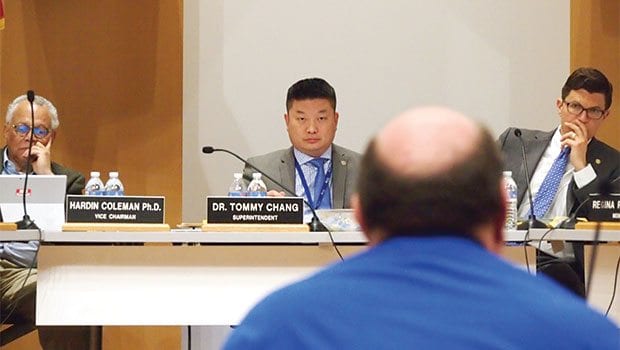School Committee passes budget, activists decry cuts
Schools forced to cut positions, programs as rising costs outpace funding

The Boston School Committee voted unanimously last week to approve the $1.109 billion Boston Public Schools budget, bringing to an end a month-long series of hearings that saw parents, BPS employees, students and advocates appealing to save programs and positions facing funding cuts.
BPS officials touted the budget as a $40 million increase over last year’s budget, and increase of 4.4 percent. But parent activists noted that the BPS calculation counted last year’s $30 million raise for teachers and staff as part of this year’s budget and asserted that the real increase is $10 million, or 1.5 percent.
Individual school cuts
In all, 44 schools will receive less funding than they received last year, according to an analysis by parent Kristen Johnson. The slashing of school budgets follows on the heels of last year, when 49 schools received funding cuts, and 2016, when widespread budget cuts led to two student walk-outs and a picket of Mayor Martin Walsh’s annual State of the City address.
Darren Wells, a member of the Black Educators Alliance of Massachusetts, said the proposed 2018-19 budget not is not sufficient to satisfy the district’s stated policy of closing opportunity and achievement gaps between black, Latino and low-income students and white students.
“The result is another year of painful, damaging cuts in schools, even those schools receiving small increases in funding. The most damaging cuts will again strike schools that are rated by the state as underperforming and are assigned by the state at accountability levels 3 and 4.”
Wells said Brighton High School, Dorchester Academy and the Henry Grew Elementary School — all rated at Level 4 — are due to receive a more than $2 million in cuts. Wells said the cuts would almost certainly condemn those schools to closure or state receivership.
He also cited the Chittick, Perkins and Winship elementary schools and East Boston High School as Level 3 schools as slated for budget reductions.
“These schools are at risk of failing and falling into Level 4 turnaround status unless BPS makes the investment required to improve their performance,” Wells said.
Greater Egleston High School and Dorchester Academy are targeted to receive cuts that Wells says will reduce the number of seats available to students in need of the alternative programs the two schools provide. Those cuts, and the cuts to Level 3 and 4 schools, violate the district’s own Opportunity and Achievement Gap policies, he added.
“Clearly, cutting funds of schools rated as underperforming [with] overrepresentations of students of color, without assessing the impact on student outcomes, violates the OAG policy,” he said.
Abundant testimony
During the last four weeks, school psychologists, paraprofessionals, parents and service providers testified about the impact of declining budgets. BPS Superintendent Tommy Chang touted the new Opportunity Index, a funding formula that takes into account the socio-economic conditions of a school’s student population when calculating funding for extracurricular activities and special programs,
“We are moving the bar on equity,” he said. “While the bar does not move easily, we are continuing to do so. Perfect cannot be the enemy of the good here.”
Parent Megan Wolf testified that the overall budget for the programs now funded through the Opportunity Index has been cut from $13 million in the 2013–14 school year down to $5.8 for next year.
“Though distribution may be more equitable, a $7.2 million cut over those years is really not something to be celebrating,” Wolf said. “Equity is critical to the success of BPS and the district as a whole, but unless we’re ready to fully support the services that are being distributed with an adequate budget, equity is really just an empty word on a tagline, not a guiding principle that will result in the full education of all students in the district.”
School psychologists testified in each hearing, calling for one psychologist at each BPS school. Currently there are only 56 BPS-employed psychologists distributed among the 126 schools in the system, forcing them to split their time between schools. At last week’s hearing, the school psychologists submitted endorsements for their demand from 55 BPS principals.
Jose Lopez, a former teacher who heads the NAACP Boston Branch Education Committee, said the budget doesn’t provide funding for the level required by state law of inclusion specialists to provide services to English language learners and special education students.
Chang said the city has increased the school budget by $170 million over the last five years, even as net state aid has fallen by $17 million, owing to a growing share of those funds going to charter schools and the Legislature’s failure to reimburse BPS for funds lost to charters.
The budget will next go to the City Council for a vote before it goes before Mayor Martin Walsh for approval. Councilors typically vote down the school budget initially while negotiating for increased funding for specific schools and programs.






